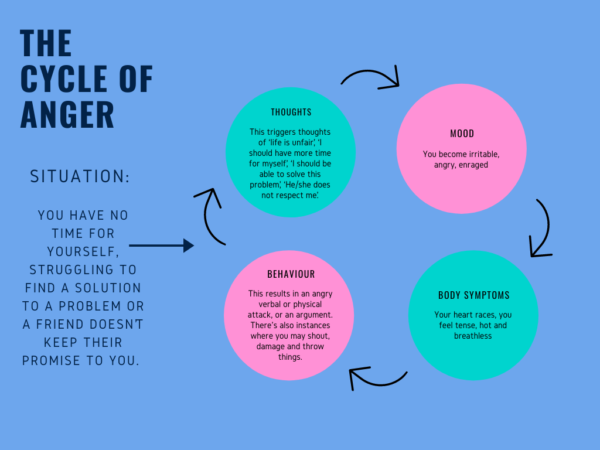When it comes to seeking self-help to support our mental health, the question of whether one needs a psychologist, psychiatrist, counsellor or coach is often the first stumbling block. Read more to find out what would be best for you.
Latest NewsWhat Causes Anger & How to Control It?

Anger often arises as a result of masking and hiding sadness, fear and pain. When we are angry, we are aware of how this affects our mood quite quickly. When anger reaches a high level, it becomes the only thing that we are aware of.
Anger is mostly directed toward a particular event or another person, but at times we can also feel anger towards ourselves.

In order to understand the causes of anger, we need to look at the whole system including: mood, emotions, behaviour and thoughts. Anger is a physiological body response to situations where our expectations are not met, we feel that our identity is attacked or we are actually feeling anxious but cannot show that anxiety (so we show anger instead). Physiological signatures include: heightened levels of cortisol, adrenaline and testosterone.
Problems with others, frustrating situations, stress or not having time for oneself can cause anger, along with debt and practical problems or feeling threatened. These examples are typically causes of the vicious cycle of anger.

Once triggered, anger manifests itself in the form of a vicious cycle:
- Situation – e.g. you have no time for yourself, struggling to find a solution to a problem or a friend who doesn’t keep their promise to you.
- Thoughts – this triggers thoughts of ‘life is unfair’, ‘I should have more time for myself’, ‘I should be able to solve this problem’, ‘He/she does not respect me’.
- Mood – you become irritable, angry, enraged
- Body symptoms – your heart races, you feel tense, hot and breathless
- Behaviour – this results in an angry verbal or physical attack, or an argument. There’s also instances where you may shout, damage and throw things.
And the cycle continues.
Thoughts, mood and behaviour affect one another, resulting in anger spiralling and exploding. Body symptoms can lead to feeling out of control and angry thoughts can increase the feeling of rage even more. Anger can vary from mild irritation to intense fury and rage. As your heart rate increases, so does your blood pressure meaning your body is experiencing “fight or flight”.
Allowing anger to take over is never helpful, unless your life is in danger and you have to fight to survive. The belief that anger needs to be let out, is simply not true, and the belief that letting off steam will make you feel better is also neither true nor good. By staying in the anger, you are allowing the vicious cycle to continue and you don’t learn to handle the situation. Beginning to understand the thoughts and triggers will enable you to gain control over the feeling of anger.
How to control anger using CBT techniques
- Focus on your surroundings and ask whether you are actually under serious threat or harm.
- Don’t expect others to be like you – people do things differently and have different ideas, behaviours and viewpoints
- Allow others to be who they are. Sometimes people may not have the same ideals as you do.
- If you notice that your expectations are not met, then ask yourself whether this situation will matter to you in 5 years’ time? If your answer is “no” then tell yourself to let it go
If you are angry with yourself – apply the same compassionate approach.
- You expected something different from yourself and things didn’t turn up as you expected.
- It is always easier to judge the situation after the event.
- Being angry with yourself is not going to help you in any way. You will not learn anything when you are angry. Your mind cannot learn in the state of anger.
- Calm yourself down by taking a few deep breaths and telling yourself that you just made a mistake and it’s ok, it happens
- You are learning from this so reflect on what went wrong, change it and then next time you will succeed.
Anger can also arise when your identity is attacked, whether it’s your gender, colour of your skin or other personal features.
For example; someone who has never used a mobile phone before may feel anxious and say that phones cause cancer. Or someone who comes from a culture where men and women have clearly defined roles and they believe that this is the only way that is correct. In these situations, it is better to ask more questions rather than get angry:
- Notice your thoughts
- Tell yourself you are not in danger. It is an opinion, not a fact.
- You may ask why the person thinks what they think (or not) and then decide whether their thoughts are justified.
- Remember – it is often not your fight
CBT therapy is great for learning to control angry behaviour. EMDR is also an effective therapy approach to remove the triggers that cause anger in the first place such as pain, fear, and hurt. If you experience anger, book a consultation today to see how we can help you.
Sign up below to hear more from us!
How we can help you Related News & Advice
Not sure what you’re looking for?
Arrange a chat with our specialist team
Awards, Accreditations & Partners
Our therapists are accredited with the following UK and EU boards:
We are also able to accept clients who are insured by AXA, WPA and BUPA
*Please enquire for all other insurance companies*








